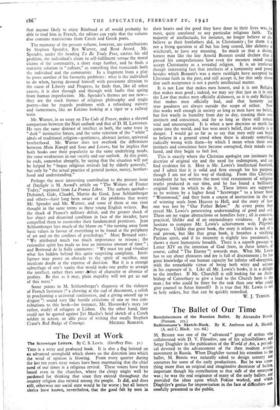The Devil at Work
The Screwtape Letters. By C. S. Lewis. (Geoffrey Bles. is.) Tins is a witty and profound book. It is also a flag hoisted on an advanced stronghold which shows us the direction into which the wind of opinion is blowing. From every quarter during the last ten years stray voices have been murmuring that the chief need of our times is a religious revival. These voices have been heard even in the churches, where the clergy might well be pardoned for thinking that since they existed throughout the country religion also existed among the people. It did, and does still, otherwise our social state would be far worse ; but all honest clerics have known, nevertheless, that the good felt by men in
their hearts and the good they have done in their lives was, far most, quite unrelated to any particular religious faith. The majority of intellectuals, for instance, no longer believe or dis- believe as their forefathers did, in 6hristianity ; for them it is not a living question at all but has long ceased, like alchemy os witchcraft, to have any meaning. So much so that a -decent, honest man like the late Arnold Bennett could declare that it passed his comprehension -how even the meanest mind could accept Christianity as a revealed religion. It is an irrelevant though interesting fact that intellects of a luminosity and pout besides which Bennett's was a mere rushlight have accepted the Christian faith in the past, and still accept it, for this only shows that such acceptance is not a purely intellectual matter.
It is not Law that makes men honest, and it is not Religion that makes men good ; indeed, we may say that just as it is only the LaW that makes men officially dishonest, so it is only Religion that makes men officially bad, and that honesty and true goodness are always outside the scope of either. Now this works well enough in society so long as men have no beliefs, but live warily in humility from day to day, trusting their own instincts and conscience, and for so long as these still remain vital and uncorrupted. It is when a new doctrine or myth has come into the world, and has won men's belief, that society is in danger. I would go so far as to say that men only can begin to believe in a general creed when there is already something radically wrong with them—by which I mean when their own instincts and conscience have become corrupted, their minds con• fused, and they begin to feel lost.
This is exactly where the Christian apologist can insinuate this doctrine of original sin and the need for redemption, and can find credence for it. Here is Mr. Lewis's intellectual foothold, and I admit that it is solid and firm enough for his purpose, though I am not of his way of thinking. From this Christika standpoint he has written the most vital restatement of religious truths produced in our time, and he has found a brilliantly original form in which to do it. These letters are supposed to be written by a higher fiend " Screwtape" to a lesser fiend " Wormwood," and they form a course of instruction in the art of winning souls from Heaven to Hell, and the story of how one was lost by ".Our Father Below." At every point they reveal Mr. Lewis's penetrating understanding of good and evil. There are no vague abstractions or homilies here ; _all is concrete, practical, lifelike and of an extraordinary vividness. I do not hesitate to -compare Mr. Lewis's achievement with Pilgrim's Progress. Unlike that great book, the story it relates is not of a real person, but like that great book, it breathes a vivifying Puritan spirit, and if its intensity is slightly less passionate, it shows a more humanistic breadth. There is a superb passage in Letter XIV on the intention of God (here, in these letters, of course, called " The Enemy ") towards man. What Mr. Lewis has to say about pleasures and joy is full of discernment ; he has great knowledge of our human capacity for infinite self-deception, with the remarkable virtue of being both witty and serious in his exposure of it. Like all Mr. Lewis's books, it is a delight to the intellect. If Mr. Churchill is still looking for an Arch- bishop of Canterbury to give a lead to the Church here is the man ; for who could be fitter for the task than one who could give counsel to Satan himself? It is true that Mr. Lewis is not in holy orders, but that can be quickly remedied.
W. J. TURNER.


























 Previous page
Previous page